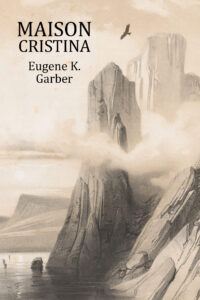 Helping me wrap up the week is novelist Eugene K. Garber. We’re chatting about this fabulist literary fiction work, Maison Christina.
Helping me wrap up the week is novelist Eugene K. Garber. We’re chatting about this fabulist literary fiction work, Maison Christina.
Bio:
Eugene K. Garber has published seven books of fiction, most recently Maison Cristina. His fiction has won the Associated Writing Programs Short Fiction Award and the William Goyen Prize for Fiction sponsored by TriQuarterly. His awards include fellowships from the National Endowment for the Arts, the National Endowment for the Humanities, and the New York State Council of the Arts. His short fiction has been anthologized in The Norton Anthology of Contemporary Fiction (1988), Revelation and Other Fiction from the Sewanee Review, The Paris Review Anthology, and Best American Short Stories. He is the author with eight other artists of EROICA, a hypermedia fiction for web, currently under revision. This work inspired the novels of the Eroica Trilogy.
Welcome, Eugene. Please tell us about your current release.
Maison Cristina tests the proposition that the powers of storytelling and spiritual quest can return to life a young woman sunken by mysterious wounds into a state of catatonia.
My seventh work of fiction, Maison Cristina, brings together two memorable characters striving to find in their relationship redemptive powers, a quest made strenuous and improbable by the deep wounds each has suffered. The medium of their struggle is storytelling. Octogenarian Peter Naughton tells stories to youthful Charlene, narratives dark but potentially healing. Even as he spins his tales, he must confront painful memories and a serio-comic demon who has haunted him from his youth.
Witnessing and often assisting in the process of redemptive remembering and telling are three nuns of strong faith who nevertheless understand that the saving of a human self is fraught with struggle and uncertainty.
Meanwhile, two other inmates of Maison Cristina offer comic relief that is uncannily pertinent to the central themes of the novel. Ms. Trask, imagining herself a descendant of a great rail family and witness of her sister’s insanity, yearns to break free of confinement. Mr. Gerrity is torturously struggling to lift himself from sloth-like inertia to articulate humanity.
The novel offers the reader mysteries compounded of darkness and hope.
What inspired you to write this book?
The project began as a work in fictionalized autobiography but after several failed attempts at convincing beginnings, it morphed into a work that now centers on the healing powers of storytelling.
Excerpt from Maison Cristina:
You’re up on the highest wall in the world, Charlene. Perched right on the edge. The sky is all around you. Not a blue dome, welkin, that kind of poetic stuff because it doesn’t matter to you if it’s glowing or weeping. You don’t care what your talons are grasping at the moment, scrabble, saxifrage, a sapling in a crevice. You depend on no such frailties. The updraft is ruffling your feathers. You feel the power. You move your telescopic eyes over the world below. Lots of quarry down there you could easily seize. Wandering wobbly calves and kids, a neglected infant in a crib, fat pigeons, rabbits, downstream salmon washed up in the shallows, the whole world in your talons. But you don’t want any of that easy prey. You’re after something bigger.
What exciting story are you working on next?
I’m working on a series of short parable-like stories based on the 15 panels of Barnett Newman’s Stations of the Cross.
When did you first consider yourself a writer?
As an undergraduate in creative writing classes at Tulane University, where I received encouragement from teachers.
Do you write full-time? If so, what’s your work day like? If not, what do you do other than write and how do you find time to write?
I try to write every day, time of day not crucial.
That should be easy for a retired person, but I have duties as a caregiver and obligations to fellow writers and ex-students.
What would you say is your interesting writing quirk?
I don’t know if it’s a quirk, but I pay a lot off attention to what an ongoing piece sounds like. I probably do a lot of subvocalizing.
As a child, what did you want to be when you grew up?
I don’t remember specific aspirations. I do remember from a very early age loving to listen to stories and loving to play with words. In this regard I suppose the protagonist of my novel echoes my love affair with words and tales.
Anything additional you want to share with the readers?
My passionate hope is that readers will find intriguing, even compelling, the woven nature of the novel: the deployment of stories to rescue a young woman from darkness; the variations on themes within the stories; the protagonist’s memories of his past and of his family history; his interactions with the nuns of Maison Cristina; and his struggles with a serio-comic demon. I also hope readers find a lot of humor, if not belly-laughs.
Thanks for being here today, Eugene!

I remember Gene when he was a guest prof at Western Wash College in Bellingham, Wa. around 1970 I believe. I was on a 2 yr fellowship in English for a master’s in Eng. ending summer 1971. I think he had a good time there but he was much too erudite for my poor poet’s brain scribblings.